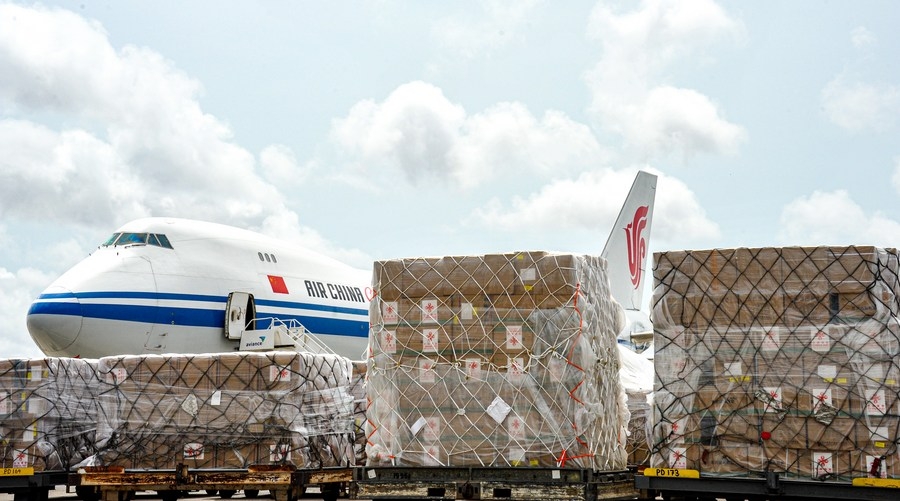ABOVE: China's medical supplies for 18 African countries arrive at Kotoka International Airport in Accra, Ghana, April 6, 2020. (Photo: Xinhuanet.com)
Chinese and African leaders hosted the ‘Extraordinary China-Africa Summit on Solidarity against COVID-19’ on Wednesday June 17. The video link event included China, South Africa and Senegal and highlighted China-Africa cooperation on fighting COVID-19 as the number of cases in the world exceeded eight million. South Africa is the current chair of the African Union, and Senegal is the co-chair of the Forum on China-Africa Cooperation (FOCAC).
Tedros Adhanom Ghebreyesus, the Director-General of the World Health Organization (WHO), making a virtual appearance from Geneva, said that China has been supporting Africa since the pandemic started. He said that many African countries have talked about the kind of support they have been receiving from China, such as in sending experts, in sharing information and in providing supplies including COVID-19 test kits. “It’s not only the health part, they have also raised the issue of economic recovery and debt relief that China is willing to support." Tedros reiterated a call for more global solidarity. "(I would) like to use this opportunity to call on (the) unity, and solidarity of the whole world." Tedros used the event to tell participants about a United Kingdom scientific breakthrough with a drug trial, saying the WHO welcomed the positive initial results from the trial of dexamethasone, a common steroid. He said the steroid has been shown to have a beneficial effect on those patients severely ill with COVID-19.
Chinese President Xi Jinping told the conference that "we must stay committed to fighting COVID-19 together”. He said China will begin the construction of a new Africa CDC headquarters ahead of schedule this year. The African CDC strengthens the capacity and capability of Africa’s public health institutions as well as partnerships to detect and respond quickly and effectively to disease threats and outbreaks, based on data-driven interventions and programs. The new headquarters will be a world class medical and research facility to further the growth, success, and capacity of Africa CDC. “We must stay committed to enhancing China-Africa cooperation. Greater priority needs to be given to cooperation on public health, economic reopening, and people's livelihood," Xi said, as reported by the Xinhua News Agency.
Xi reinforced the Chinese view of the importance of nations cooperating to fight COVID-19 telling participants that "we must stay committed to upholding multilateralism. China will work with Africa to uphold the UN-centered global governance system and support WHO in making greater contributions to the global COVID-19 response."
"We must stay committed to taking China-Africa friendship forward," Xi said.
The COVID-19 pandemic has exposed the weaknesses and the strengths of international organizations and states. A few countries have become more protectionist in confronting the virus. American President Donald Trump announced in May that he was pulling the United States out of the WHO (and its funding) at a critical period in the middle of the pandemic. Trump’s announcement comes at a time when American COVID-19 cases are well over two million with over 116,000 deaths. The move was not well received domestically or internationally, with many observers saying it will ultimately weaken the US's global influence and could have adverse effects for small and poor countries who tend to be more affected by the outbreak than major powers. Less developed countries have been more vulnerable to the impact of the COVID-19 crisis, with many of their economies and people's livelihoods on the brink of collapse. They often depend on the WHO and other international organizations for assistance, so when the basic funding of the WHO is put at risk, it can adversely impact them. In contrast to the Americans, China, Canada, and several European countries have reinforced their commitment to the WHO and announced additional funding to the organization.
COVID-19 continues to deeply disrupt global supply chains and will make development among countries in the post-pandemic era difficult. The effects of the crisis are causing changes to economic, social, and political relationships around the world. China, Africa, Canada, and most European countries continue to call for the strengthening of multilateralism to defeat the global pandemic. They believe it cannot be stopped by countries acting alone and that coordinated international efforts are the only way to overcome the current crisis.

